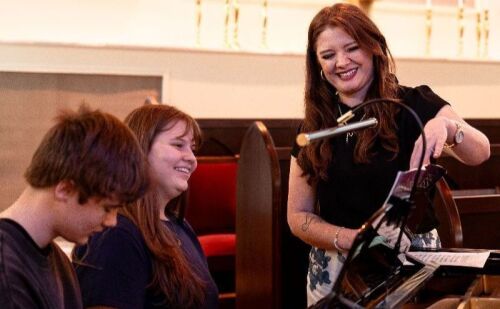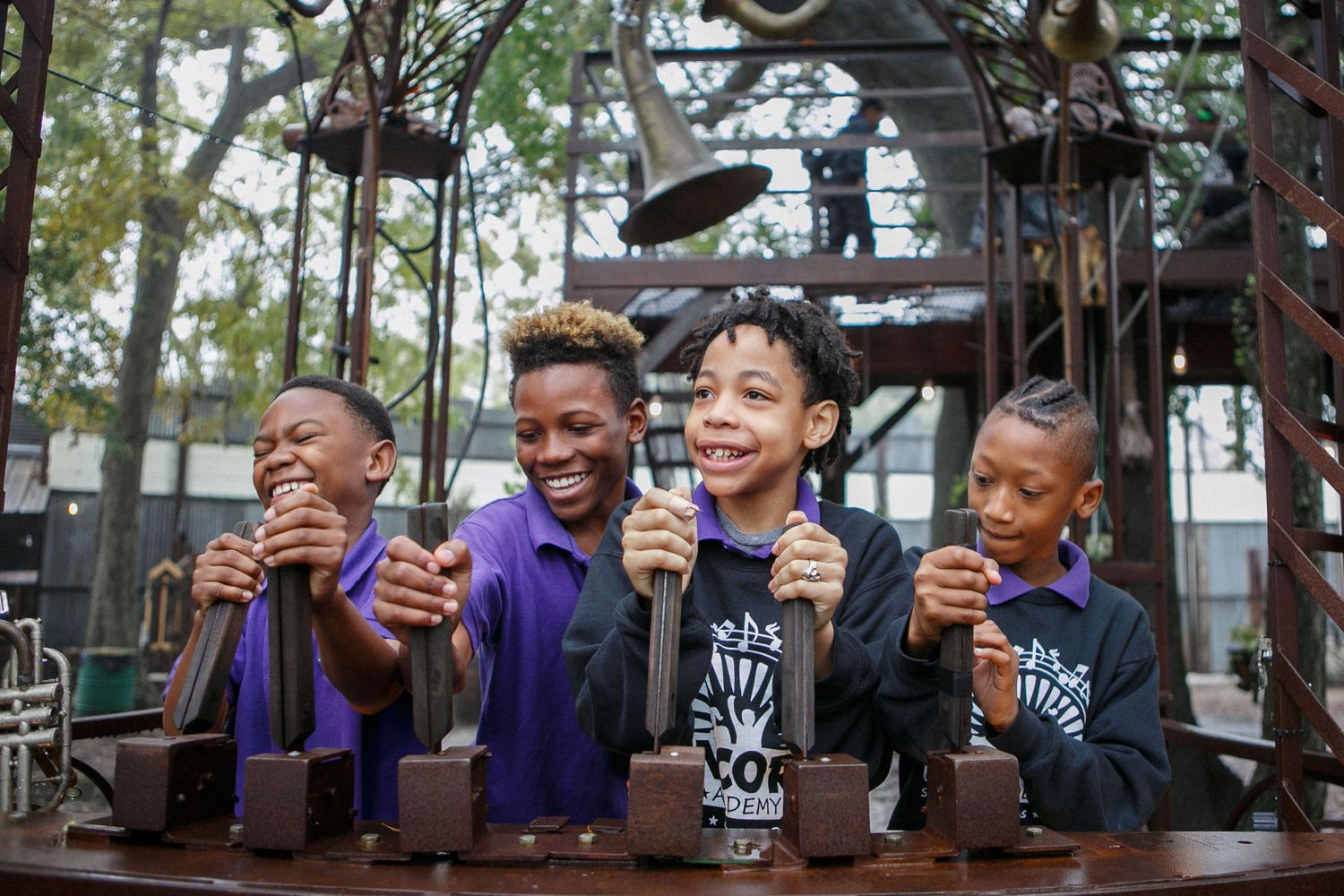
Topics
News & Resources
GUEST PERSPECTIVE
The Courage to Create: Helping Students Sing through Fear
Meagan Mayne, Founder, Meagan Mayne Voice Studio

The author, with students. Photo: Sarah John Photography.
While recently reading the novel Don Quixote, Part II, I came across a passage that struck me deeply. Author Miguel de Cervantes writes:
“There is no book so bad that it does not have something good in it. But even so, no book ever escapes being censured—even if it is filled with wisdom, elegance, and erudition—because some people will criticize its style, others its lack of substance, some the lack of purity in the language, and still others its fables, its inventions, or its long-windedness.”
And later:
“To publish a book is to expose oneself to great danger, because no matter how much care you put into it, it is impossible to satisfy everyone’s taste.”
Immediately, I thought about singing—about my own life as a singer and about my students, who bravely step into lessons, rehearsals, and performances, putting their voices out into the world.
Singing (really, any artistic act) is an act of vulnerability. Your voice is you—your breath, your body, your emotions, your story. When you sing, you offer all of that up; even after a lifetime of performing, I still feel that fear when I step on stage.

If performing can be scary for us educators, how much scarier must it be for teen students still discovering their identity—for whom “fitting in” can feel like the most important thing?
In my experience, students’ fears usually come down to two things: fear of imperfection, and fear of being judged. These fears are human, especially during adolescence. As educators, we have the chance to mentor students through these inner battles—the only question is how.
The Fear of Imperfection
Many students worry they’ll sing the wrong note or fall short. Some stop themselves before they even begin: “I’m bad at this,” they say. But what they mean is: “I’m afraid to fail.”
Our job is to help them redefine failure as a necessary part of learning, rather than something to be ashamed of.
- I tell my students, “Make loud mistakes. If I can’t hear it, I can’t help you.”
- I remind them that I still get nervous and that nerves are your body’s way of preparing to do something important.
- I help them realize that excitement and nervousness feel almost the same in the body: stomach knots, sweaty palms, a fast heartbeat. The only real difference is how we interpret it. Saying “I’m excited” instead of “I’m nervous” helps the brain and body associate those feelings positively.
- Above all, I praise effort. When students take a risk, I say, “You were brave” or “Look at your progress.” Confidence has room to grow when we shift the goal from sounding perfect to getting better.
The Fear of Being Judged
Students often say things like, “People think this music is stupid” or “Nobody listens to classical music.” Sometimes, they hold back not because they don’t care but because they care deeply. They want to fit in and fear that being different or transparent might bring ridicule.
I remember one skeptical student telling me, “When I show my friends, they just stare at me like they don’t get it.” People said she sounded “proper”; she couldn’t tell if it was a compliment or a dig.
When I encounter these concerns, I remind students that they’re not creating for everyone. It’s okay if some don’t connect with your music—the ones who do will feel it deeply because it’s authentic.
We also discuss how music thrives on diversity, especially diversity of opinion. When students understand that disapproval is inevitable, it stops being so scary. They learn to survive it and keep creating anyway.
From Fear to Connection
When we believe in our students—not just their potential but their present, imperfect voices—they begin to believe in themselves. Here are a few ways I help students move from fear to pride:
- Make it familiar. Connect classical music to books, movies, or games they already love.
- Celebrate difference. Singing in another language or interpreting a centuries-old poem isn’t weird; it’s remarkable.
- Affirm skill without ego. We are good at what we do, but we’re not superior to people without the same skills.
- Encourage leadership. When students love their craft openly, others often begin to respect or even to love it.
- Build community. One student told me that finding just a few peers who liked classical music made all the difference. Community can be the turning point between hiding and sharing.
My initially skeptical student, concerned about seeming “proper,” eventually focused on what felt right for her. Recognizing that her artistry and voice would carry her in life, she started celebrating her skills as something rare and powerful. “Some people can run a four-minute mile,” she said. “I can sing French arias.”
We’re not just building musicians. We’re helping young people become courageous, self-aware, expressive human beings. Let’s guide them through fear, help them use their voices, and remind them that the act of creating is always brave. For those who dare, the world is made richer.
Related Content
All Regions, Community Building, Editorials, Gather Together, Opinion, Perspectives & Collective Action, Professional Development, Program Design, Student Voice & Leadership, Teaching & Learning, the ensemble
EDITORIAL
Musical Benchmarks Build Equity
Patrick Scafidi
All Regions, Collaborations, Community Building, Events/Performances, Gather Together, News and Resources, North America, Professional Development
New ESUSA Opportunities & Events
Patrick Scafidi
Collaborations, Community Building, Europe, Events/Performances, Funding & Support, Gather Together, Middle East, News and Resources, Professional Development
Funding Opportunity for Arab Artists Based in Europe
Patrick Scafidi
Collaborations, Community Building, Featured, Gather Together, New Orleans, North America, Perspectives & Collective Action, Student Voice & Leadership

The Importance of Free Play in Music Education
Patrick Scafidi


